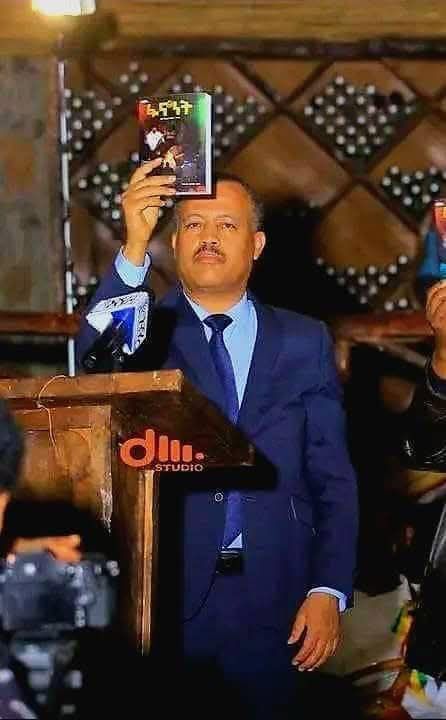
I am Fano!!! and I would like to bring attention to specific matters that have arisen during the current legal proceedings. I respectfully seek your approval to present this clarification to the honorable judges, as it is essential for a thorough comprehension of the issues involved.
Mr. Yohanes Boayalew has underscored the significance of integrity. Maintaining ethical standards is crucial, particularly in legal settings where transparency and honesty are vital for the pursuit of justice.
I appreciate your consideration of this request, which aims to enhance the judges’ understanding of the case. I am confident that this clarification will promote a more informed dialogue, ensuring that all relevant aspects are meticulously reviewed.
In a world often marred by the specters of corruption and misconduct, integrity shines forth as an enduring beacon of virtue. This intrinsic quality is not just a mere abstraction but something firmly rooted in our actions and choices. A manifestation of this timeless principle can be found in my own actions, a conviction I resolutely uphold. Today, we explore a recent situation involving Mr. Yohannes who has firmly made his stance known in light of a court’s decision. But what does this imply, and how does this intertwine with the larger discourse on integrity and accountability? Let’s unmask the meanings behind the messages and delve deeper into the world where integrity is not only preached but lived by.
Integrity, a term commonly used but at times misunderstood, is crucial in the complex dynamics of today’s society. Essentially, it pertains to the consistency of actions, values, principles, outcomes, and expectations. It is a litmus test of character and moral stature.
When it comes to the role and importance of integrity in society, two particular facets stand out. These are building trust and credibility, and its role in personal development.
For individuals and institutions alike, integrity is elemental in building trust and credibility. Trustworthiness and reliability are foundations of fruitful relationships, be it personal or professional. When integrity is upheld, it garners trust and respect from peers, colleagues, and society at large.
Integrity plays an irreplaceable role in personal development as well. It shapes individuals’ character, influences behavior, and guides decision-making processes. It ensures accountability for one’s actions and encourages a commitment to ethical and moral values.
While understanding the importance of integrity, it’s equally vital to acknowledge the challenges to upholding it. Two such obstacles that stand robust are corruption and misconduct across various sectors.
Unfortunately, corruption has been a long-standing barrier to sustaining integrity. It is a plague that compromises fair practices and undermines the principles of honesty and transparency. Its ripple effects corrode the societal fabric and breed distrust.
Likewise, misconduct in various sectors, including political, corporate, and academic circles, further hampers efforts towards upholding integrity. From cheating scandals in educational institutions to ethical breaches in businesses, misconduct challenges the very tenets of integrity.
In the final analysis, acknowledging the importance of integrity while confronting and combating challenges is key to fostering a society that is resilient, accountable, and ethically sound.
In the context of Yohannes Boayalew’s assertion, it is essential to delve deeper into the topics of corruption and misconduct. For this, we need to scrutinize its various forms and consequences.
Political and bureaucratic corruption are widespread forms of malfeasance. Elections, public procurement, and the enforcement of laws are areas particularly susceptible. Politicians misuse public funds, accept bribes, and engage in illegal practices to gain or retain power, while bureaucrats may employ their positions for personal gains, subverting the rule of law.
Corporate misconduct, another prevalent type of corruption, manifests in various forms ranging from financial fraud, insider trading, corporate espionage, to even environmental negligence. Deceptive practices used to deceive shareholders or manipulate market conditions are common instances of such conduct. This form of corruption often results in the loss of billions of dollars and has the potential to shake economies.
The economic impact of corruption is staggering. It distorts market mechanisms, deterring businesses and investment, hampering the growth of an economy. It creates inequality, leading to wealth concentration in the hands of a few. Countries that continually suffer from high levels of corruption find it challenging to maintain stable economic growth.
Beyond the economic effects, corruption also brings about profound social and ethical repercussions. It undermines the value of hard work and merit, promoting dishonesty and mistrust in society. Moreover, it weakens the social fabric by fostering frustration and a sense of injustice among the public. As Yohannes Boayalew voiced, “The assertion that corruption and misconduct do not exist is unfounded,” the existence of these issues continues to be a critical hindrance to societal development.
As we delve into the effects of corruption, we understand the importance of combatting it effectively. This is the pressing need of the hour if we are to achieve a society built on trust, credibility, and fairness, embodying the principle of integrity that Boayalew advocates for. Understanding the many forms and impacts of corruption is the first step in this direction.
An ongoing war is being waged against corruption on a global scale. The insistence by Yohanes Boayalew that corruption exists and is a widespread issue only serves to underline the importance of this fight. The strategies to combat corruption can be broadly classified into two categories: policy and legislative measures, and promoting ethical culture.
An essential weapon in the war against corruption is legislation. Anti-corruption laws are designed to deter and penalize corrupt practices, thereby providing a framework for public and private sector entities to operate within the bounds of integrity. These can take many forms, ranging from bribery and fraud laws to whistle-blower protections. Nations worldwide are stepping up their legislative game to combat corruption, setting clearer rules and stricter penalties—revealing the importance of a legal backbone in upholding integrity.
To supplement anti-corruption laws, transparency and accountability initiatives have found favor among policy strategists. These initiatives often involve bringing the activities of government bodies and enterprises under greater public scrutiny, thereby reducing the scope for concealed corruption. Making business procedures more transparent and holding individuals accountable for their actions are significant steps towards combating corruption. Motivating them to walk the path of integrity, a light on their actions would make them less likely to make unethical choices.
In addition to legislative measures, promoting an ethical culture can have a substantial impact on combating corruption. A vital ingredient in this formula is education and awareness. By making people aware of the evil effects of corruption and educating them about the virtues of integrity, societies aim to instill values that resist corruption at a grassroots level. Schools, colleges and even workplaces can initiate programs to educate individuals about the advantages of integrity, helping to foster a corruption-free environment.
The role of leadership cannot be ignored in the fight against corruption. “Leadership by example” is a powerful strategy. When those in positions of power commit to exemplifying the highest degree of integrity and ethical behavior, the ripple effects can be significant. The values leaders embody tend to infiltrate the ranks, influencing behavior throughout their sphere of influence. When the top tier echelons of society choose to lead with integrity, it creates a benchmark for others to follow.
In conclusion, as can be deduced from Yohanes Boayalew’s affirmations, there is no illusion that corruption exists and needs to be confronted. The implementation of stringent laws, the establishment of transparency in processes, the spread of education, and the promotion of ethical leadership are all valuable steps in this direction. By embracing these strategies, society can hope to combat corruption effectively, securing a future where integrity is not just a virtue, but a norm.
Mr. Yohannes’ recent statements have stirred a discussion that transcends beyond the immediate courtroom environment but into the broader societal context. His assertion on the existence of corruption and misconduct, coupled with his proclamation of embodying integrity, leaves a profound imprint on our understanding of these issues.
The court’s decision, in this case, speaks volumes about the state of justice and fairness on the contemporary political stage. The court noted, without a doubt, the presence of corruption and misconduct. It further affirmed Yohannes’ claim that these vices exist and must be acknowledged for what they are. This acknowledgment validates Yohannes’ stance
The admission of corruption and misconduct by a court of the law might have extensive repercussions on various sectors. Stakeholders, especially political entities, corporations and the general public will need to reconcile with this affirmed reality and take necessary steps to address the systemic problems. Public trust may be shaken, but it also opens up room for structured reforms and vital conversations about integrity and accountability.
Mr.Yohannes steadfast in his advocacy for integrity, has ignited public discourse around this virtue. He not only professes integrity as a personal principle but emphasizes its need especially in the public and corporate sector where the danger of corruption and misconduct lurk. By supporting integrity in public discourse, he challenges individuals and institutions to review and reset their moral compasses.
Going forward, Mr.Yohannes’s statement will set a precedence for ethical leadership. He stands as a beacon for leaders, prompting them to uphold integrity and shun corruption and misconduct. His call isn’t restricted to leaders alone but also implicated for future generations who will hold leadership roles. His mark in advocating for integrity will hopefully inspire a shift in the narrative – from one that merely condemns corruption to one that celebrates and embodies integrity. Perhaps then, this would make Yohannes’s assertion less of a ‘belief’ and more of a lived reality.

